Related Research Articles

Elfriede "Elfi" von Dassanowsky was an Austrian-born singer, pianist, and film producer.

Robert von Dassanowsky FRHistS, FRSA was an Austrian-American academic, writer, film and cultural historian, and producer. He was usually known as Robert Dassanowsky.
The Dassanowsky family is the name of the Austrian branch of the Polish noble magnate family Taczanowski which came to Vienna in 1683 and has produced notable figures in Austrian civic and cultural life. Dassanowskyweg in the 22nd District (Donaustadt) of Vienna was named in recognition of the family.
Fritz Schulz was a German and Austrian movie and stage actor, singer and director.

Cinema of Austria refers to the film industry based in Austria. Austria has had an active cinema industry since the early 20th century when it was the Austro-Hungarian Empire, and that has continued to the present day. Producer Sascha Kolowrat-Krakowsky, producer-director-writer Luise Kolm and the Austro-Hungarian directors Michael Curtiz and Alexander Korda were among the pioneers of early Austrian cinema. Several Austrian directors pursued careers in Weimar Germany and later in the United States, among them Fritz Lang, G. W. Pabst, Josef von Sternberg, Billy Wilder, Fred Zinnemann, and Otto Preminger.
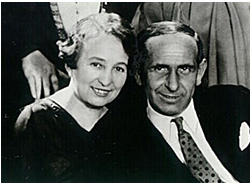
Luise Fleck, also known as Luise Kolm or Luise Kolm-Fleck, née Louise or Luise Veltée, was an Austrian film director, and has been considered the second ever female feature film director in the world, after Alice Guy-Blaché. Her son, Walter Kolm-Veltée, was also a noted film director. Chronologically, however, the second female feature film director in the world after Alice Guy-Blaché was Ebba Lindkvist, having debuted as a film maker one year before Luise Fleck.

Jacob Fleck was an Austrian film director, screenwriter, film producer and cameraman. He is noted for his long-standing professional partnership with his wife Luise Fleck who co-directed his films with him.
Julius von Borsody was an Austrian film architect and one of the most employed set designers in the Austrian and German cinemas of the late silent and early sound film periods. His younger brother, Eduard von Borsody, was a film director in Austria and Germany. He is also the great-uncle of German actress Suzanne von Borsody.

Karl Hartl was an Austrian film director.

Young Medardus is a 1923 Austrian silent historical drama film directed by Michael Curtiz and starring Victor Varconi, Egon von Jordan and Agnes Esterhazy. Based on a play with the same name by Arthur Schnitzler, it is set during the 1809 French occupation of Vienna during the Napoleonic Wars.

Maximilian Hugo Bettauer was a prolific Austrian writer and journalist, who was murdered by a Nazi Party follower on account of his opposition to antisemitism. He was well known in his lifetime; many of his books were bestsellers and in the 1920s a number were made into films, most notably Die freudlose Gasse, which dealt with prostitution, and Die Stadt ohne Juden, a satire against antisemitism.
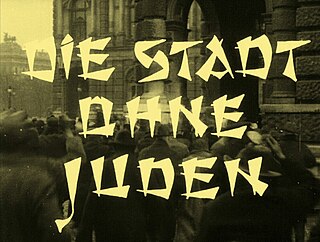
The City Without Jews is a 1924 Austrian Expressionist film by Hans Karl Breslauer, based on the novel of the same title by Hugo Bettauer. The film is one of the few surviving Expressionist films from Austria and has therefore been well researched. The film was first shown on 25 July 1924 in Vienna.
Judith Trachtenberg is a 1920 German silent drama film directed by Henrik Galeen and starring Leontine Kühnberg, Ernst Deutsch and Leonhard Haskel. It was based on the 1890 novel of the same title by Karl Emil Franzos. In 1932 it was released in the United States, re-edited to include sound, under the alternative title A Daughter of Her People. It was one of a significant cycle of films in the early 1920s which dealt with issues of Jewish cultural assimilation including Love One Another (1922), The Ancient Law (1923) and The City Without Jews (1924). The film's plotline of a Jewish woman becoming involved with an aristocratic figure follows what is known as an "Esterka story".
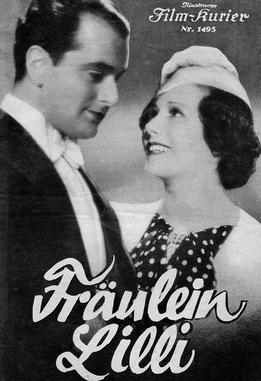
Fräulein Lilli or Miss Lilli is a 1936 Austrian comedy film directed by Hans Behrendt, Robert Wohlmuth and Max Neufeld. It starred Franciska Gaal, Hans Jaray and S.Z. Sakall. It was Gaal's last European film, although she did briefly start work in 1946 on Renee XIV, before it was abandoned during filming.
Oh, Dear Augustine is a 1922 Austrian silent film directed by Hans Karl Breslauer and starring Willi Forst. It takes its title from the popular Viennese song "Oh du lieber Augustin".
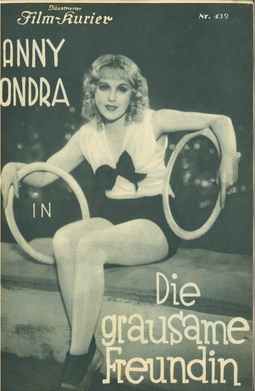
The Cruel Mistress is a 1932 Austrian-German comedy film directed by Carl Lamac and starring Anny Ondra, Fritz Rasp and Lina Woiwode. A separate French-language version Should We Wed Them? was also released. The film's sets were designed by the art directors Otto Erdmann and Hans Sohnle.

Her Corporal is a 1956 Austrian historical comedy film directed by E. W. Emo and starring Peter Weck, Traute Wassler, and Paul Hörbiger.
Dora Kaiser (1892-1972) was an Austrian film actress of the silent era. Originally trained as a dancer, she began her career on stage before making her film debut in 1918. When Austria's leading film star Liane Haid left Wiener Kunstfilm, Kaiser replaced her in the company's films.
The House of Molitor is a 1922 Austrian silent film directed by Hans Karl Breslauer and starring Alfred Abel, Anny Miletty and Magda Unger.
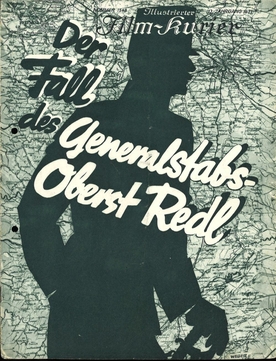
The Case of Colonel Redl is a 1931 Czechoslovak spy drama film directed by Karl Anton in German language. It stars Theodor Loos, Lil Dagover and Otto Hartmann. It was a co-production between the Prague-based companies Elektafilm and Sonor Film. A separate Czech-language version The Affair of Colonel Redl was also shot at the same time. It was based on a 1924 book of the same title by Egon Erwin Kisch, detailing the story of Alfred Redl.
References
- ↑ Von Dassanowsky p.32